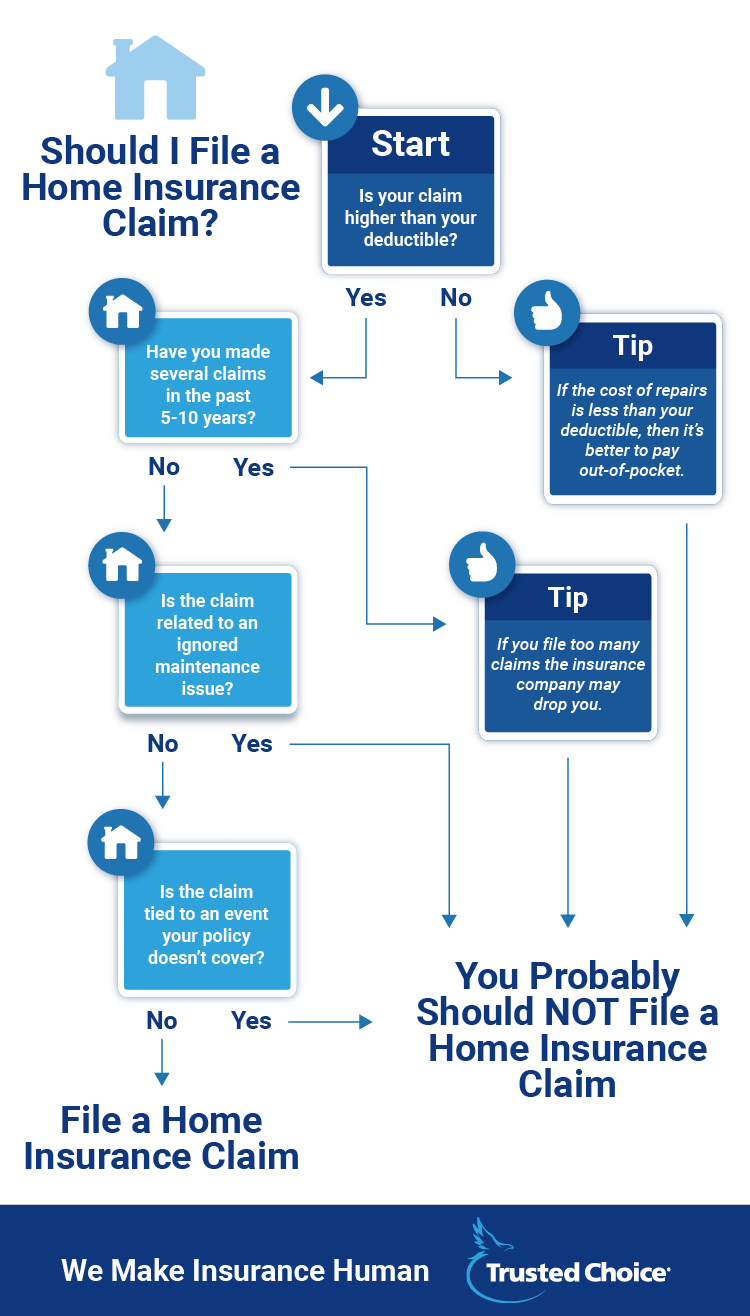Understanding Home Insurance Claims
Learn how to decide when filing a home insurance claim is worth it, how to file, and more.

Paul Martin is the Director of Education and Development for Myron Steves, one of the largest, most respected insurance wholesalers in the southern U.S.

Your home is much more than a place to hang your hat. It's where you store your personal belongings and even host company on occasion. If a disaster occurred that resulted in property damage or injury, you might have to file a claim through your homeowners insurance. But there are some instances when filing a claim just isn't worth it.
Fortunately, an independent insurance agent can help you determine when it would be beneficial to file a home insurance claim. They can also file claims for you directly. But first, here's a breakdown of the home insurance claims process and when it makes sense to file, to get you started.
Steps for Filing a Homeowners Insurance Claim
Whether your home was vandalized, damaged by a storm, or something else, you might need to file a home insurance claim. Here's what to do if a disaster happens to your home.
Follow these simple steps to file a home insurance claim:
- Contact your independent insurance agent: When you decide to file a homeowners insurance claim, you’ll start by contacting your agent. They can help guide you through the process and outline the actions your insurance company will take next, as well as answer any questions you may have.
- Assess and document the damage: Take photos and videos of the damage, and write down what’s been destroyed or stolen. If the damage is structural, use caution when shuffling through your home.
- Report crimes to the police: If you’ve been burglarized, let the police know when it happened and what was stolen.
- Fill out the claim forms: If you decide to file a claim, you’ll need to provide a list of everything that was lost or damaged to your insurance company.
- Prepare for an adjuster to come: Schedule a visit with an insurance adjuster, then don’t move or touch anything until they can assess the damage in person.
An independent insurance agent can also file claims for you and provide you with an ETA of when your insurance company will finish each step of the claims process.
Is Filing a Claim Worth it?
Really, no one can answer this question except for you, and it comes down to each specific scenario, as well as personal preference. Filing a home insurance claim can be time-consuming and there's always a possibility of your claim getting denied. While your independent insurance agent can help advise on whether it makes sense to file a claim after an incident, there are ways to break this answer down even further.
When to File a Homeowners Insurance Claim
The decision of when to file a homeowners insurance claim doesn’t have to be a difficult one. Keeping these four major determining factors in mind can greatly help to simplify your decision if you’re ever on the fence.
File a home insurance claim if one of the following applies:
- The loss exceeds your predetermined amount: Some homeowners automatically file claims for any damage that will exceed their deductible, no matter how small the amount. It’s up to you to decide what amount will be your baseline for filing a claim. Consider how much money you’d be willing to pay out of pocket for various incidents, and how much your deductible would have to be exceeded to justify going through the claims process for you.
- The incident could become a liability claim: Any incident that could turn into a liability claim should be reported to your insurance company immediately. Insurance contracts typically state that it’s the policyholder’s duty to report liability incidents, such as injuries, ASAP. It’s best to go ahead and file even if the claim seems minor because the sooner you report an incident, the better chance your insurance company will have at defending you.
- There’s property damage you can’t fully assess: It’s not always possible to assess the extent of property damage at first glance. Damage may be much more extensive (and costly) than you’re able to determine upfront. Until a professional inspection has been done, it’s impossible to know the full extent of the damage or the cost of repairs. It’s best to file this type of property damage as a claim so you can get the right amount of reimbursement for necessary repairs.
- The damage is too costly for you to fully cover yourself: In the event of a particularly expensive incident, it’s wise to file a claim to try to secure some financial reimbursement from your insurance company. It’s also helpful to file a claim for larger incidents because the insurance company will arrange for a professional evaluation of the extent of the damage.
While it’s not possible to list every potential scenario in which an insurance claim should be filed, having this handful of factors to go off of will provide a good springboard for you to make your decision. Your independent insurance agent can also help you to determine when filing a claim is appropriate.
When Not To File a Home Insurance Claim
Filing home insurance claims comes with the risk of not only a denial from your home insurance company, but also of your insurer increasing your policy's premiums. But if there is significant damage to your home where the cost to repair or replace your property will drastically outweigh your deductible, you're likely to want to file a claim anyway.
Here are a few examples of when you would not want to file a claim:
- If your claim is not much more than your deductible: The payout won’t be worth the potential increase in premium.
- If you’ve made several claims in the past 5 to 10 years: This could cause your insurance company to drop you.
- If the claim is for something your insurance doesn’t cover: If you try to file a claim for something your home insurance policy excludes, it will be denied automatically.
- If the damage is related to poor maintenance: Insurance companies consider routine maintenance of the home to be the homeowner's responsibility, so coverage is not provided by your policy.

Again, your independent insurance agent can help you decide if filing a home insurance claim is worth it based on your specific scenario.
How Long Does It Take to File a Claim?
The short answer is that it depends. Your insurance company is probably required to send you claims forms within 30 days after you file, but it can take much longer than that for the claim to be resolved and for you to get reimbursed. Insurance companies often have 10 to 30 days to accept a claim receipt, and up to an additional 40 days to decide whether they’ll accept or reject the claim. If a claim is accepted, the insurance company may take several weeks or even months to pay out the claim amount.
Patience is key during the claims process. Some claims can take up to a year or more to be fully resolved. Be sure to stay in touch with your independent insurance agent throughout the process. Let them know any status updates as they happen so they can stay informed if your agent is not directly handling the claim for you already.
How Much Will My Homeowners Insurance Cover If I File a Claim?
So you’ve filed a claim and it’s been accepted by your insurance company. Now you’re likely to be wondering just how much your insurance company will cover. After paying your deductible, you’ll be responsible for paying any amount exceeding your homeowners insurance policy’s limit for whatever category the incident falls under, such as personal property or dwelling coverage (i.e., if something happens to the home’s structure).
A standard homeowners policy has a deductible that’s typically one percent of the home’s value, so if your home is worth $300,000 and the incident falls under the personal property category of coverage, you might have to exceed $3,000 in stolen or damaged personal property before getting reimbursed. Your reimbursement amount will be determined by your specific policy and if it includes coverage for the property’s full replacement value or if depreciation is factored in.
If the incident falls under the dwelling coverage category, the limit is often 10% of your home’s total value. So if you’ve got a $300,000 home, your dwelling coverage may be limited to $30,000. You’ll still have to exceed your deductible amount before the insurance company’s reimbursement will kick in.
Preemptive Measures before Claim Time Comes
If your entire house burned down unexpectedly, chances are you wouldn’t remember every item of value inside. Being organized and having purchase records and receipts on hand can help make the claim process much easier. There are a few simple things you can do to be prepared:
- Make a video of your house that shows your belongings.
- Make note of anything of particular value and how much it cost at the time of purchase.
- Keep receipts from any furniture and home décor purchases.
- Know the specific models of any appliances and electronics.
- Keep records and receipts from any home upgrades.
- Have a list of all your possessions and how much they’re worth.
- Understand your home insurance policy and what it covers.
Taking a few simple action steps in advance can greatly help streamline the process of filing a claim should you ever need to.
What If My Home Is Uninhabitable During the Claim Process?
If a hailstorm wipes out half your roof, you won’t be able to stay in your home during the claim process. If you’re displaced from your home, keep track of your extra living expenses. These can include:
- Hotel rooms
- Takeout meals
- Laundromat fees
- Extra gas to commute to work
- Loss of rental income if you were renting out a room in your house
Your home insurance policy should include coverage for loss of use or additional living expenses, so be sure to keep track of any financial burden that comes with leaving your house temporarily. Keep in mind that the disaster must be covered by your home insurance for you to receive reimbursement for the loss of use of your home.
Damage Homeowners Insurance Won’t Cover
Not everything is covered by a basic homeowners insurance policy. In fact, certain disasters are excluded by home insurance coverage, such as:
- Flood damage caused by natural sources (e.g., hurricanes)
- General wear and tear of the home
- Insect damage and infestation
- Damage from earthquakes
- Malicious or intentional acts against others
- Business-related losses (unless you purchased an endorsement)
If you live in an area where any of these situations is a potential threat, you can always add the proper coverage to your insurance. Your independent insurance agent can help you add flood insurance, earthquake insurance, or home-based business insurance if you're in need of it.
The Benefits of Working with an Independent Insurance Agent
Independent insurance agents have access to multiple insurance companies, ultimately finding you the best home insurance coverage, accessibility, and competitive pricing while working for you. They'll shop and compare quotes and present you with only the best options for home insurance.
iii.org
